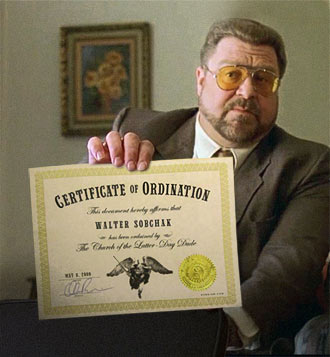1 Corinthians 7:1-16
Having condemned sexual immorality, St. Paul now proceeds to the best possible guard and aid against such sin: a proper view and use of marriage. There is nothing wrong with being single. While singles at times express in a way feeling out of place in the church, especially when the pastor is preaching or teaching about marriage, they should in no way feel like second-class Christians. In fact, St. Paul says that he would have all remain single if they were able. Not all have the gift of Paul, however, the gift of celibacy, of the unmarried life, and so it is also good and right if a single person desires marriage and prays for a spoune, for St. Paul concedes that most should marry in order to participate in the God-pleasing intimacy that marriage affords and satisfy their sexual desires within the boundaries of God’s will.
St. Paul not only concedes that most should marry, but he goes so far as to urge husband and wife not to deny each other sexually, except for a short time for prayer, lest one spouse or the other fall into and be given to lust. While St. Paul commends the ideal of a celibate life, he is a realist, and he would not have one strive for celibacy only to fall into unchastity (shunning marriage from well-intentioned piety only to fall into impious lust or sexual activity). No, it is much better for one to be chaste, that is, to enjoy God’s gift of sex without sin within the marriage relationship He has established.
So important is sex to a healthy marriage and marriage to a healthy sex life that St. Paul writes, “The husband should give to his wife her conjugal rights, and likewise the wife to her husband. For the wife does not have authority over her own body, but the husband does. Likewise the husband does not have authority over his own body, but the wife does.” The sexual relationship within marriage is indeed, therefore, an expression of Christian love, each spouse putting the other before himself or herself, seeking to provide for their sexual needs and to help guard them against sexual temptations. There is nothing dirty about the sexual act within the marital relationship, as some have mistakenly felt in past ages in the history of Christianity. No, sex is not only not dirty, but it is a crucial part of wedded life. For that reason, when a marriage struggles, one of the places that many times becomes obvious is in the bedroom, and, on the contrary, many times when a couple’s relationship in the bedroom languishes the marriage struggles in other ways as well.
That is not to say, however, that sex is the be-all and end-all of a marriage. Sexual desire waxes and wanes. Should a couple mutually have a lessening of desire over time or for a time, so long as it is mutual, there is also nothing wrong with a lack of sexual activity (in this way born, not out of a selfish unwillingness of one spouse or the other, but out of a mutual contentment in that regard). Once again, Christian love and the avoidance of temptation must be our guide. For this reason, open and honest discussion must be cultivated, as in other areas, in this part of the relationship as well.
St. Paul then reiterates Christianity’s high view of the sanctity and indissoluble nature of marriage. “To the married I give this charge (not I, but the Lord): the wife should not separate from her husband (but if she does, she should remain unmarried or else be reconciled to her husband), and the husband should not divorce his wife.” And while the Bible clearly encourages marriage between like-minded believers, the Apostle makes clear that even when one spouse is a believer and the other is not, unless the unbelieving spouse deserts the marriage, the Christian should remain in the union, praying that God would convert his or her spouse and striving to raise the children in a Christian manner as best he or she is able.
When a man or woman is widowed, and thus a marriage ends by the death of a spouse and thus without sin, it is good if he or she chooses to remain single, but not necessary, and it is not in any way a sin for them to remarry. It is better to marry than to fall into sexual sin. It is better to marry than to fall into loneliness or despair, if one longs again for the companionship and intimacy of married life. God’s blessing upon marriage is no less present when a widow or widower marries a second time.
With these principles for marriage, St. Paul seeks to guard the church against such sin as he was forced to confront in the previous chapter, and the danger remains the same today, and so the principles still serve and apply well.
Lord Jesus, help husbands love their wives as You love the Church and wives submit to their husbands as to You, each mutually submitting to the needs and for the benefit of the other in whatever ways they are able. Bless Christian marriages with firm commitment, godly devotion, and selfless affection. Bless those who are single with chastity of thought, word, and deed, and let them live, like Paul, their single life to Your glory. Help those who desire marriage to seek and find faithful and pious spouses who will share with them a proper understanding of marriage and a fervent trust in You. Comfort the widows and widowers. Grant them peace in the midst of the loss of loved ones. Should they still feel inclined toward marriage, yearning for the blessings You within that estate grant, help them also to find godly spouses. Give all of us a high view of the institution of marriage, that by our attitudes, prayers, and conduct we might strive to uphold it to the benefit not only of Your Church but of our society as a whole. And, most importantly, keep us in all of our relationships rooted in the forgiveness sins, for that is the life of the Christian life and the love that breeds love like no other. Amen.
Wade Johnston
For more content like this, check out the podcast, blog posts, and devotions at www.LetTheBirdFly.com.
You can listen to our latest episode here. You can find our latest installment in the Wingin’ It series on Luther here.
For more writing by Wade, you can find his books here and more blog posts here.







